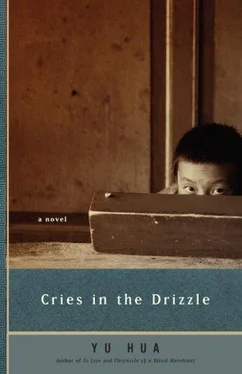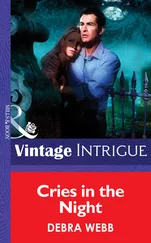And so, when I returned home I was greeted not by the sight of my older brother taking his punishment, but by that of my father waiting for me under the elm tree, rope in hand.
Owing to my little brother's false testimony, the facts of the case had now taken on a completely new cast: it was only because I had cut him with the sickle that my big brother had bathed my face in blood.
Father tied me to the tree and gave me a thrashing that I will never forget. During the beating the village children stood around in a circle and watched with rapt attention while my brothers complacently maintained order.
After this episode I made two marks, one large, one small, on the last page of my composition book. I kept a record of every beating I suffered at the hands of my father and my big brother.
Now, so many years later, I still have that composition book, but its mildewy odor makes it impossible to reexperience the urge for revenge that animated me then. It evokes instead a vague sense of wonder, which in turn brings to mind the willow trees of Southgate. I remember that one morning in early spring I noticed with surprise that their withered branches were dotted with tender green buds. This lovely image, when it now reappears in my consciousness so many years later, turns out to be intimately linked with the composition book that is the symbol of my childhood humiliations. Perhaps that is how memory works, outlasting loves and hates to make its entrance unaccompanied and unencumbered.
Just as my family situation was going from bad to worse, something else happened that created an unbridgeable gap between me and the other members of my household and also destroyed my reputation in the village at large.
Adjacent to our private plot was a tract tended by the Wang family, which included among its members a pair of brothers, the strongest men in the whole village. The elder of the two was married, his older son the same age as my little brother. Arguments over private plots were commonplace in Southgate and I can no longer recall exactly what triggered this particular dispute. All I remember is that it was late in the afternoon and I was sitting by the pond watching my parents and brothers as they engaged in an unending altercation with the six members of the Wang family.Our side appeared to be in the weaker position, or at least it was making less noise. This was particularly true of my little brother, who was still unable to enunciate swearwords as clearly as his opposite number in the Wang household. Practically everyone in the village was standing around watching, and a few came over in an effort to pacify the antagonists, only to be sent packing. Some time later I saw my father hurling himself at his adversaries, his fists flying. The younger of the two Wang brothers, Wang Yuejin, seized his wrist and with one blow sent him hurtling into the rice paddy. My father unleashed a string of curses and just as he tried to climb soggily to his feet, Wang Yuejin kicked him back into the field. Mother screamed and threw herself at Wang Yuejin, but he dodged to one side and gave her a shove that sent her headlong into the paddy as well. My parents floundered about clumsily, like chickens tossed into a lake. I bowed my head in distress at the sight of them thrashing around.
Later my big brother charged over brandishing the kitchen cleaver, my little brother hot on his heels grasping a sickle. My big brother aimed a blow at Wang Yuejin's buttocks.
A dramatic reversal of fortune ensued. Under the onslaught of my brother's cleaver, the Wang brothers, who had seemed so invincible just moments earlier, retreated to their house in alarm. My brother chased them right to their door, where the Wang brothers grabbed fish spears in an effort to fend him off. But when he recklessly threw himself at them, cleaver flailing, they dropped the fish spears and ran for their lives.
Inspired by his big brother's example, my little brother raised his sickle high in the air and gave a battle whoop, quite the intrepid warrior. But he had trouble keeping his balance as he ran and tripped over himself several times.
Throughout the whole confrontation I remained rooted to my spot next to the pond, and it was because of my detached role as spectator that the villagers — no matter whether they were my father's supporters or his detractors (the Wangs included) — came to the conclusion that in all the world there could not be another person as degenerate as me, and it is not hard to imagine what kind of reception I got from my own family. My big brother, on the other hand, was proclaimed the hero of the hour.
There was a period when I would make a point of quietly observing the Su family as I sat by the pond or cut grass for the sheep. The two town boys did not emerge from their house all that often, and the farthest they ever went was to the cesspit at the edge of the village, where they immediately turned back. One morning I saw them come out of the house and stand between the two trees in the front yard, pointing at something as they talked. Then they walked over to one of the trees, and the older of the two squatted down on his haunches while the younger climbed onto his back. The one carried the other over to the second tree, where they exchanged positions and the younger boy carried his older brother back to the original spot. They repeated this routine over and over again, and each time one threw his weight on the other's back I could hear their infectious laughter. The two brothers’ laughs sounded very much alike.
Later on three bricklayers came from town, bringing two loads of red bricks. A wall was erected around the Sus’ house, enclosing the two trees, and I never again saw the Su brothers playing the game that so captivated me. But I often heard laughter from the other side of the wall, so I knew they still played it.
Their father, a doctor, worked at the hospital in town. Often I saw him strolling along the road late in the afternoon, a man with clear skin and a gentle voice. Once, however, he didn't come home on foot as usual, but sped past me, perched on the saddle of one of the hospitals bicycles. I was heading home with a basketful of grass and was startled by the sound of a bicycle bell behind me. He was calling his sons as he rode past.
The two boys went into ecstasies as soon as they came out the door and raced joyfully to meet the bicycle, while their mother stood by the side of the lane, greeting with a smile the returning man of the house. The doctor loaded his two sons onto the bicycle and rode off along a path between the fields. They shrieked with excitement, and the younger boy, who sat in front, rang the bell incessantly. This spectacle made the village children green with envy.
When I was sixteen, in my first year of high school, I tried for the first time to come to terms with the word family. I hesitated for a long time, faced with the choice between my home in South-gate and Wang Liqiang's home in Littlemarsh, and the understanding I finally reached was inspired by the memory of that particular scene.
My first contact with the doctor occurred some time before the argument over the private plots. I had been back at Southgate only a few months then, and Granddad was still alive. After staying with us for a month, he had gone off to my uncle's house. Meanwhile I had come down with a fever that left my mouth parched dry. I lay in bed for two days, all in a daze. Our ewe was just about to lamb and the rest of the family was out in the pen, so I was alone in the house, listening groggily to the noises outside. My brothers’ shrill voices were particularly audible.
Later my mother appeared by my bedside and said some-thing or other, then went out. Next time she appeared Dr. Su was by her side. He placed the palm of his hand on my forehead, and I heard him say, “Must be a hundred and two.”
Читать дальше












